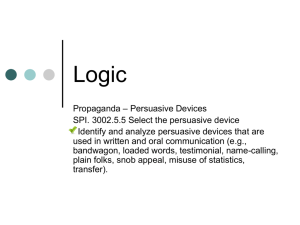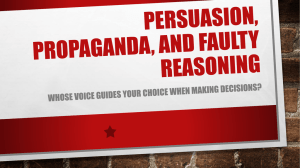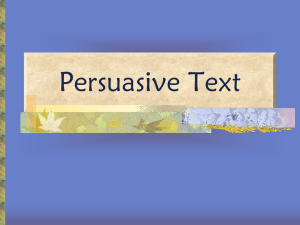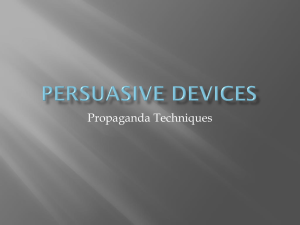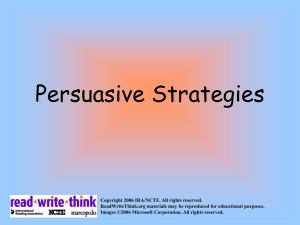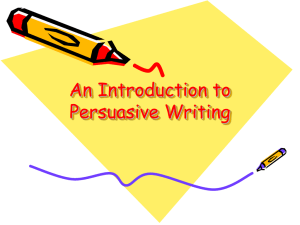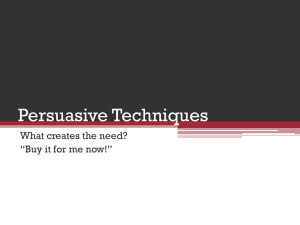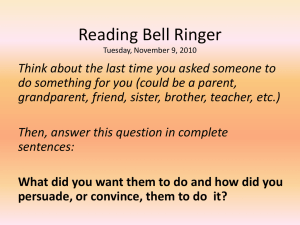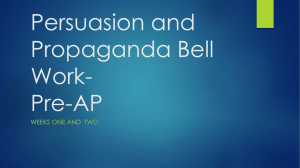Persuasive techniques
advertisement
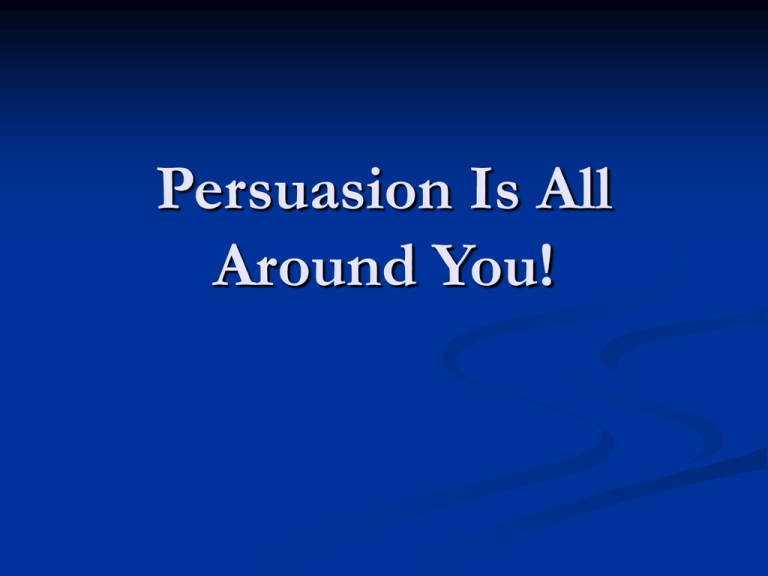
Persuasion Is All Around You! What is persuasion? A means of convincing people: to buy a certain product to believe something or act in a certain way to agree with a point of view Common Propaganda Techniques Used In Advertisement Testimonial Transfer Bandwagon Personal Attack 1. Testimonial Using the words of a famous person to persuade you “Got Milk?” Sports figures promoting athletic gear, sports drinks, or shoes. 2. Transfer Using the names or pictures of famous people, but not direct quotations, to persuade you Using the product will make you look or feel like the people in the ad 3. Bandwagon Persuading people to do something by letting them know others are doing it Gives the impression that you will be left out if you don’t do what you are being persuaded Key words: Everyone, all, many Example: “See why so many women have switched” (shampoo advertisement) 4. Personal Attack An attempt to persuade a reader to support one idea or product by attacking a competing idea or product Example: Paper towel commercials (Bounty vs. another paper towel maker) Let’s See What You’ve Learned! Number your ½ sheet of paper from 1-7. Identify the propaganda techniques being used in the following ads. Remember your choices: testimonial, transfer, bandwagon, and personal attack. What propaganda technique is being used? What propaganda technique is being used? What propaganda technique is being used? What propaganda technique is being used? What propaganda technique is being used? What propaganda technique is being used? What propaganda technique is being used? Common Persuasive Techniques Used In Writing Repetition Allusion Logical Appeal Emotional Appeal Ethical Appeal 1. Repetition Repeating a word or phrase multiple times throughout the writing for emphasis. Example: Hunger. It affects all of us at some point in the day. Hunger. Our growing bodies need fuel to help us function. Hunger. It is keeping many of us from achieving our best in school. 2. Allusion An allusion is a brief reference to some thing, person, or idea the audience would respect, helping credibility. Example: Allusions to the Bible may get a Christian's support. 3. Logical Appeal An appeal to a reader's sense of logic, and what "makes sense." Uses lots of evidence (FACTS) Example: If an individual on a diet wants to eat chocolate, then the logical choice would be a low-fat or sugar-free chocolate bar. 4. Emotional Appeal Using details to create an emotional response from the reader (pity, disgust, fear, anger, etc.) Example: Donating only $20 a month can help feed a starving family of four in Africa. 5. Ethical Appeal When the writer tries to persuade the audience to respect and believe him or her. Through TONE an author's attitude toward his/her audience and subject becomes clear. Example: You know it’s the right thing to do; vote now for the candidate with the most experience. Let’s See What You’ve Learned! Number your ½ sheet of paper 1-5. Identify the persuasive techniques being used in the following ads. Remember your choices: repetition, allusion, logical appeal, emotional appeal, and ethical appeal. What persuasive technique is being used in this advertisement? HEAD ON Apply directly to the forehead HEAD ON Apply directly to the forehead What persuasive technique is being used in this advertisement? What persuasive technique is being used in this advertisement? What persuasive technique is being used in this advertisement? “Four out of five dentists recommend sugarless gum for their patients who chew gum.” What persuasive technique is being used in this advertisement?

